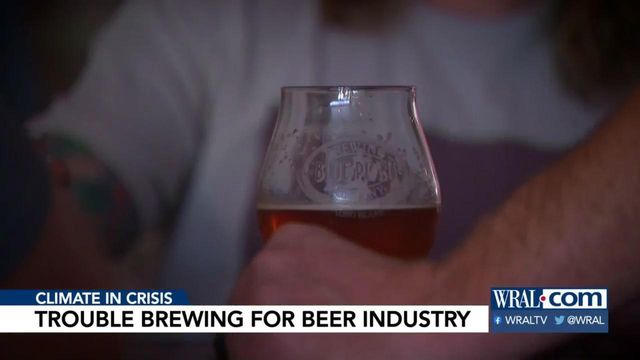Changing climate brewing trouble for the craft beer industry
Trouble is brewing for the craft beer industry across the United States. Barley, hops, and water, three of beer's key ingredients at local breweries, are all becoming harder to produce in a warming world with extreme rainfall patterns.
Posted — UpdatedSebastian Wolfrum, of Epiphany Craft Malt in Durham, works within that supply chain.
"What we do here is malt all kinds of grain, small grain, so it’s primarily barley, wheat, rye, rice. What we are doing is the pre-step in order to make successful beer," he said.
Without malting, there’s no brewing, and barley is particularly susceptible to changing weather – especially heat, drought and floods. Traditionally, most of the country's barley has come from the Northern Rockies and Upper Midwest, but the warming climate and drought in those areas means a big financial risk to farmers.
Wolfrum says winter barley grown in North Carolina might be the future. He expects brewers to gradually move toward winter barley from other grains because it’s too risky to grow the short-period spring barley.
But winter barley comes with its own set of risks.
"What we tend to have is too much rain during the growing season and so the fungi, the spores that are on the grain damage it so it can’t be used. So that’s one of our big problems here," Wolfrum said.
"The cost what we have to pay, we pass on to the brewers and eventually the consumers have to pay more."
The key, Wolfrum said, is to get ingredients that work.
From farmers to brewers to drinkers, there are plenty of people interested in working on a solution. According to the Beer Saves America report done by a trade association that represents the brewing industry, small and independent breweries counted more than 135,000 jobs directly at breweries and brewpubs in 2017 and the U.S. beer industry generated more than $328 billion in total economic output in 2018. North Carolina produces over 1 million barrels of craft beer per year.
To respond to the economic threat, Epiphany Craft Malt has signed the Brewery Climate Declaration, committing to renewable energy and waste reduction.
"There needs to be some mechanisms to invest in resilience and pathways into the future as weather changes and our lifestyles have to change," Wolfrum said.
He hopes that everyone will do their part to help the environment so that future generations can crack open a cold one with their families and friends.
"Beer is very social," he said. "You sit down and you talk about anything when you have beer, and this should be a part of the conversation."
Related Topics
• Credits
Copyright 2024 by Capitol Broadcasting Company. All rights reserved. This material may not be published, broadcast, rewritten or redistributed.






